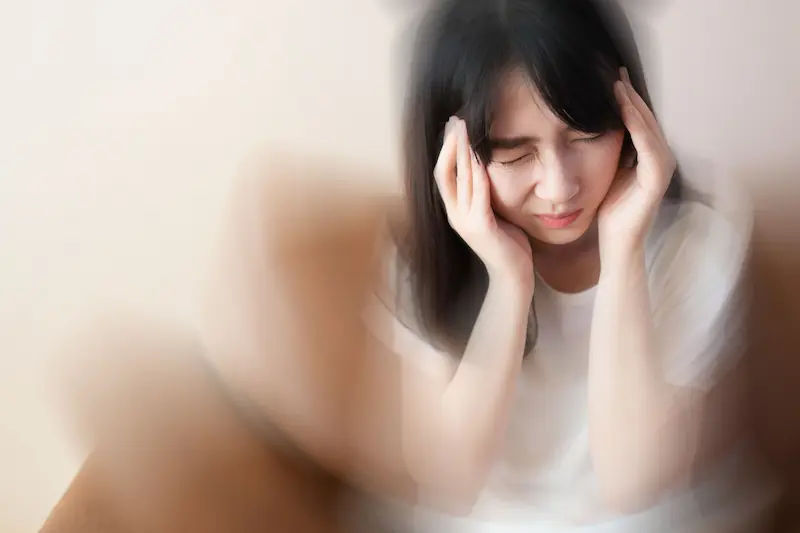Guide to Reasons For Dizziness
Discover the common reasons for dizziness, including inner ear problems (vertigo, BPPV), low blood pressure, anxiety, and more. Learn when to see a doctor and how to manage symptoms.

Written by Dr. Siri Nallapu
Reviewed by Dr. Rohinipriyanka Pondugula MBBS
Last updated on 13th Jan, 2026

Introduction
Feeling off-balance, lightheaded, or like the room is spinning? You’re not alone. Dizziness is one of the most common reasons people see a doctor, yet the word “dizzy” can mean very different things—from brief wooziness after standing up too fast to intense vertigo with nausea. This guide translates medical jargon into plain language and walks you through the most likely reasons for dizziness, what to do in the moment, and how to prevent it from recurring. We’ll cover inner-ear issues like BPPV, circulatory and metabolic causes like dehydration and low blood pressure, migraine-related dizziness, medication side effects, anxiety-related dizziness, and special situations like pregnancy or post-viral symptoms. You’ll learn simple home checks, evidence-based treatments, and when symptoms signal something serious. If symptoms persist beyond two weeks, consult a doctor online with Apollo24|7 for further evaluation. Let’s unpack the top reasons for dizziness—so you can feel steadier, safer, and more in control.
What doctors mean by “dizziness” (and why words matter)?
When you tell a clinician you’re dizzy, they’ll ask what it feels like, because different descriptions point to different reasons for dizziness. Four common experiences:
• Vertigo:
A spinning sensation (you or the room) that often worsens with head movement. Think “merry-go-round.” This suggests an inner-ear (vestibular) cause like BPPV, vestibular neuritis, or Meniere’s disease.
• Lightheadedness/presyncope:
Feeling faint or “about to pass out,” often from low blood pressure, dehydration, or low blood sugar. Clues include improvement after sitting or drinking fluids.
• Imbalance/disequilibrium: Feeling unsteady on your feet, particularly when walking. This can reflect aging changes, neuropathy, vision issues, or chronic inner-ear problems.
• Nonspecific “wooziness”:
Hard-to-describe foggy sensation; sometimes linked to anxiety, medication side effects, or persistent postural-perceptual dizziness (PPPD).
• Why it matters:
The right labels save time. For instance, “vertigo when lying down” points to BPPV, which responds to a specific repositioning maneuver (Epley). “Dizziness when standing up” suggests orthostatic hypotension, calling for hydration and blood pressure management. Clinicians often use structured approaches like the TiTrATE framework—timing, triggers, and a targeted exam—to home in on the cause efficiently. Quick safety check: Is it an emergency?
While most dizziness isn’t dangerous, a few “red flags” demand urgent care:
• Stroke signs:
Sudden severe dizziness with trouble speaking, facial droop, one-sided weakness, double vision, or severe headache. Call emergency services immediately.
• Heart symptoms:
Dizziness with chest pain, shortness of breath, palpitations, fainting, or a new irregular heartbeat needs urgent evaluation.
• Infection signs:
High fever, stiff neck, severe headache, or confusion could indicate meningitis or severe inner-ear infection.
• New hearing loss:
Especially sudden, one-sided hearing loss with vertigo requires prompt care.
• Head injury:
Dizziness after trauma can signal concussion or bleeding and warrants immediate assessment.
Not an emergency, but see a clinician soon:
• Recurrent dizzy spells affecting daily life
• Progressive imbalance or falls
• Dizziness with new neurological symptoms (numbness, slurred speech)
• If symptoms don’t improve after a few days, or persist beyond two weeks, consult a doctor online with Apollo24|7 for further evaluation.Consult a Top General Physician
inner-ear (vestibular) reasons for dizziness
• BPPV (Benign Paroxysmal Positional Vertigo):
Tiny calcium crystals in the inner ear canals move out of place and trigger vertigo when you roll in bed, look up, or bend over. Episodes are brief (seconds) but intense, often with nausea. The Dix-Hallpike test in clinic helps confirm BPPV; the Epley maneuver repositions the crystals. A Cochrane review shows canalith repositioning maneuvers significantly increase vertigo resolution versus no treatment.
• Vestibular neuritis/labyrinthitis:
A viral inflammation of the vestibular nerve (neuritis) or inner ear (labyrinthitis). This causes sudden, severe, constant vertigo lasting hours to days, often with nausea and trouble walking. Labyrinthitis may also cause hearing loss or tinnitus. Treatment focuses on anti-nausea meds and early vestibular rehabilitation. The HINTS bedside exam can help clinicians distinguish inner-ear causes from stroke in continuous vertigo.
• Meniere’s disease:
Caused by fluid imbalance in the inner ear. Classic triad: episodic vertigo (20 minutes to hours), fluctuating hearing loss, and ear fullness or ringing. Low-salt diet, diuretics, and, in some cases, injections or surgery can help. Your doctor may refer you for audiometry (hearing test) and ENT evaluation.
Circulatory and metabolic reasons for dizziness
• Dehydration and orthostatic hypotension:
Standing pulls blood downward; if your body can’t compensate, you may feel lightheaded. Orthostatic hypotension is defined as a drop of 20 mm Hg systolic or 10 mm Hg diastolic within 3 minutes of standing. Triggers include dehydration, hot weather, bleeding, or certain medications (like diuretics). Increase fluid intake, rise slowly, and review meds with your doctor. Compression stockings and salt liberalization are sometimes advised.
• Low blood sugar (hypoglycemia) and anemia:
Low glucose can cause jitteriness, sweating, and dizziness—common in people with diabetes using insulin or sulfonylureas. Anemia (low hemoglobin/iron) reduces oxygen delivery and may cause fatigue, pallor, and lightheadedness. Tests like fasting glucose/HbA1c and a complete blood count (CBC) can help; Apollo24|7 offers convenient home collection for tests like vitamin D or HbA1c and iron studies when relevant.
• Heart rhythm problems:
Arrhythmias (such as atrial fibrillation or heart blocks) can reduce blood flow, causing dizziness, palpitations, or fainting. These deserve urgent evaluation, often with an ECG and sometimes Holter monitoring.
Neurological and migraine-related dizziness
• Vestibular migraine:
If you have a history of migraine headaches, dizziness can be the main event. Episodes may last minutes to hours with or without headache, and may include sensitivity to light and sound, motion sensitivity, or visual aura. Triggers include stress, certain foods, poor sleep, and hormonal shifts. Management overlaps with migraine care: trigger tracking, regular sleep, hydration, and preventive or abortive medications if needed.
• Central causes (less common but serious):
Stroke, transient ischemic attack (TIA), multiple sclerosis, or brain tumors can cause dizziness, especially when paired with neurological symptoms (double vision, limb weakness, slurred speech, severe imbalance). A careful neurological exam, sometimes supported by imaging, guides the diagnosis. In acute, continuous vertigo with nystagmus, trained clinicians may use the HINTS exam, which has shown high accuracy in distinguishing central from peripheral causes in expert hands.
Medications, alcohol, and substance-related dizziness
Medications are a frequently overlooked reason for dizziness. Common culprits include:
• Blood pressure meds (especially when doses change)
• Sedatives and sleep aids (benzodiazepines, some antihistamines like diphenhydramine)
• Antidepressants and antipsychotics
• Anti-seizure drugs
• Diuretics (can cause dehydration and electrolyte shifts)
• Some antibiotics or chemotherapy agents (rare vestibular toxicity)
Alcohol can trigger acute dizziness or worsen balance; withdrawal from alcohol or benzodiazepines can cause significant unsteadiness. Caffeine and stimulant overuse may provoke lightheadedness, while withdrawal can cause headache and fatigue.
Anxiety, stress, PPPD, and POTS
• Anxiety-related dizziness:
Hyperventilation during anxiety or panic can cause lightheadedness, tingling, and chest tightness. Even low-level chronic stress can amplify the brain’s “threat monitoring,” making you feel off-balance in crowds or open spaces.
• PPPD (Persistent Postural-Perceptual Dizziness):
A chronic dizziness (usually >3 months) described as swaying, rocking, or “brain fog,” worse when upright, with movement, or in visually complex environments. It can start after a vestibular event (like BPPV), a migraine, or a period of stress. Treatment often includes vestibular rehabilitation therapy (VRT) and sometimes SSRIs/SNRIs and cognitive behavioral therapy (CBT).
• POTS (Postural Orthostatic Tachycardia Syndrome):
Characterized by a heart rate increase of at least 30 beats per minute (or to >120 bpm) within 10 minutes of standing without a significant blood pressure drop. Symptoms include dizziness standing up, palpitations, fatigue, and brain fog. Management includes fluids, salt (as directed), compression garments, graded exercise, and, in some cases, medications.
Dizziness in special situations
• Pregnancy and postpartum:
Blood volume and blood pressure change in pregnancy; morning sickness and dehydration can cause lightheadedness. Iron deficiency is common and may contribute to fatigue and dizziness. Safe strategies include adequate fluids, slow position changes, small frequent meals, and iron supplementation if advised. Seek care for severe or persistent symptoms.
• Older adults:
Age-related vision changes, peripheral neuropathy, medications, and inner-ear degeneration can combine to increase imbalance and fall risk. Proactive steps—home safety checks, strength and balance exercises, vision and hearing care—make a big difference.
• After COVID-19 or other viral infections:
Post-viral dizziness can stem from deconditioning, autonomic changes (including POTS), or persistent inner-ear inflammation. A gradual return-to-activity plan, hydration, salt as appropriate, and vestibular rehab may help. Seek evaluation if symptoms are severe or worsening.
How do doctors diagnose the reasons for dizziness?
• History is king:
Timing, triggers, duration, and associated symptoms often reveal the cause. For example, “seconds-long vertigo with head turns” points to BPPV; “hours-long vertigo with hearing changes” suggests Meniere’s; “lightheadedness when standing” suggests orthostatic hypotension. Keep a dizziness diary, noting what you were doing, how long it lasted, and what helped.
• Bedside tests:
The Dix-Hallpike test checks for BPPV. The HINTS exam (Head-Impulse, Nystagmus, Test of Skew) helps distinguish inner-ear from central causes in continuous vertigo—high accuracy in trained hands. Orthostatic vitals check blood pressure and heart rate responses to standing.
• Tests:
Many people don’t need imaging. Blood tests may include CBC (for anemia), electrolytes, glucose/HbA1c, thyroid function, and sometimes B12 or vitamin D. Hearing tests (audiometry) are used if hearing fluctuates. ECG can evaluate palpitations or fainting. MRI or CT is reserved for red flags or atypical features. Apollo24|7 offers a convenient home collection for tests like CBC, ferritin, HbA1c, TSH, and vitamin D when your doctor recommends them.
Evidence-based treatments and self-care
• Epley maneuver for BPPV:
A specific sequence of head and body positions that moves inner-ear crystals back where they belong. In controlled studies, canalith repositioning leads to faster symptom resolution vs sham (number-needed-to-treat is low). If you’re unsure, have a clinician guide your first maneuver.
• Vestibular rehabilitation therapy (VRT):
Customized exercises (gaze stabilization, balance tasks) retrain the brain to adapt after inner-ear injuries and for PPPD. Many people notice improvements within weeks.
• Hydration and circulation support:
For orthostatic lightheadedness, aim for adequate fluids, limit alcohol, and consider salt intake as advised. Compression stockings (20–30 mmHg) and gradual conditioning can help. For POTS, graded recumbent exercise transitioning to upright training is key.
• Medications—use wisely:
Short-term anti-nausea meds (ondansetron) can help during acute vestibular neuritis. Vestibular suppressants like meclizine are sometimes used short-term but can slow compensation if overused—avoid prolonged use unless directed. Migraine preventive or abortive therapy may help vestibular migraine.
Everyday prevention and staying safe
• Hydration habits:
Keep a water bottle handy; add an electrolyte solution on hot days or during illness.
• Smart standing:
Rise slowly from bed; pause at the edge of the bed before standing; flex calves to boost circulation.
• Nutrition and routine:
Don’t skip meals if prone to low blood sugar; balance carbs with protein and fiber.
• Home safety:
Reduce trip hazards, add night lights, secure rugs, install grab bars where needed.
• Lifestyle:
Limit alcohol; moderate caffeine; aim for regular sleep; incorporate balance and strength exercises 2–3 times weekly.
• For triggers:
If you notice dizziness after scrolling or in supermarkets (visual motion sensitivity), try tinted lenses, reduce screen motion settings, or practice graded exposure with VRT guidance.
When to see a doctor and what to ask?
Book medical care if:
• Dizzy spells are recurrent, worsening, or impacting daily activities
• You have hearing changes, persistent headaches, or new neurological symptoms
• You’re older or have heart disease, diabetes, or are pregnant
• What to bring and ask:
• A dizziness diary (timing, triggers, duration, associated symptoms like nausea or hearing changes)
• A list of photos of all medications and supplements
• Home measurements (blood pressure/heart rate, especially standing vs lying)
• Questions: “Could this be BPPV, vestibular neuritis, Meniere’s, migraine, or orthostatic hypotension?” “Should I try the Epley maneuver or vestibular rehab?” “Do I need blood tests or an ECG?”
If symptoms persist beyond two weeks or affect your safety, consult a doctor online with Apollo24|7 for further evaluation. If lab work is advised, Apollo24|7 offers home collection for CBC, HbA1c, ferritin, TSH, and vitamin D.
Consult a Top General Physician
Conclusion
Dizziness can be unsettling, but it doesn’t have to be mysterious. By noticing what the sensation feels like—spinning, lightheadedness, or unsteadiness—you can narrow down the most likely reasons for dizziness and choose the right next step. Inner-ear causes like BPPV respond well to the Epley maneuver and vestibular rehabilitation; circulatory and metabolic causes improve with hydration, nutrition, and medication adjustments; migraine and anxiety-related dizziness benefit from trigger management and targeted therapies. Keep an eye out for red flags that warrant urgent care, and don’t hesitate to seek help if dizziness keeps returning or impacts your safety. A few simple tools—a dizziness diary, home vitals, and a medication review—go a long way toward clear answers. If symptoms continue beyond two weeks or you’re worried, consult a doctor online with Apollo24|7 for tailored advice. With the right knowledge and support, most people find a path back to steady ground.
Consult a Top General Physician

Dr Vinay Kumar A V
Nephrologist
8 Years • MBBS, MD - General Medicine, DM - Nephrology
Bilaspur
Apollo Hospitals Seepat Road, Bilaspur

Dr. Hariprasath J
General Physician/ Internal Medicine Specialist
19 Years • MD (Gen Med), FCCP, Dip (Diabetology, UK)
Chennai
Apollo First Med Hospitals P H Road, Chennai
(225+ Patients)

Dr. Naresh
General Physician/ Internal Medicine Specialist
5 Years • MBBS, MD (General Medicine)
Mahbubnagar
SIMS HOSPITAL, Mahbubnagar
Dr. Sasikamalam
General Practitioner
1 Years • MBBS
COIMBATORE
Apollo Sugar Clinic Coimbatore, COIMBATORE

Dr . Meghana M S
Family Physician
4 Years • MBBS
Bengaluru
Apollo Medical Center, Marathahalli, Bengaluru
Consult a Top General Physician

Dr Vinay Kumar A V
Nephrologist
8 Years • MBBS, MD - General Medicine, DM - Nephrology
Bilaspur
Apollo Hospitals Seepat Road, Bilaspur

Dr. Hariprasath J
General Physician/ Internal Medicine Specialist
19 Years • MD (Gen Med), FCCP, Dip (Diabetology, UK)
Chennai
Apollo First Med Hospitals P H Road, Chennai
(225+ Patients)

Dr. Naresh
General Physician/ Internal Medicine Specialist
5 Years • MBBS, MD (General Medicine)
Mahbubnagar
SIMS HOSPITAL, Mahbubnagar
Dr. Sasikamalam
General Practitioner
1 Years • MBBS
COIMBATORE
Apollo Sugar Clinic Coimbatore, COIMBATORE

Dr . Meghana M S
Family Physician
4 Years • MBBS
Bengaluru
Apollo Medical Center, Marathahalli, Bengaluru
More articles from Dizziness
Frequently Asked Questions
1) Why am I dizzy and nauseous all of a sudden?
Sudden vertigo with nausea often points to an inner-ear cause like BPPV or vestibular neuritis. If you also have a severe headache, weakness, or double vision, seek urgent care. Otherwise, try the Epley for positional vertigo and contact a clinician if symptoms persist. [4][5]
2) Why do I get dizzy when standing up?
Likely orthostatic hypotension from dehydration, medications, or low blood pressure. Hydrate, rise slowly, and log your blood pressure and heart rate lying vs standing. If symptoms persist, consult a clinician and consider Apollo24|7 for guidance and tests.
3) Can anxiety cause dizziness every day?
Yes. Anxiety and PPPD can cause persistent wooziness or motion sensitivity, especially in busy environments. Vestibular rehab and CBT can help; some people benefit from SSRIs/SNRIs.
4) Is dizziness a sign of low iron or low blood sugar?
It can be. Anemia and hypoglycemia both cause lightheadedness and fatigue. Tests like CBC, ferritin, and HbA1c can clarify causes; Apollo24|7 offers home collection for these labs if advised.
5) What is the best home treatment for vertigo when lying down?
For BPPV, the Epley maneuver is highly effective. If you’re unsure which ear is affected or if the maneuver isn’t helping, see a clinician for a proper diagnosis and guided treatment.

